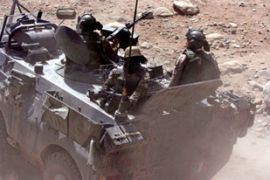Nato seeks Afghan reinforcements
Allies pledge additional help at meeting in Holland, but shortages remain.

| In video | ||||
Fighting to reconstruct Helmand province
|
Nato commanders also pressed for allies to provide more teams of training experts to be embedded with Afghan army units.
“Fair risk and burden sharing has to be a leading principle for Nato.”
Diplomats said nine of the 26 Nato nations had made new troop offers which are likely to be confirmed next month during a meeting at Nato’s military headquarters in southern Belgium.
| “If we do not prevail, consequences for the public in Europe will be dire” Jaap de Hoop Scheffer, Nato secretary-general |
Nato members have complained that they are overstretched due to other commitments, including Iraq, Kosovo and Lebanon.
Al Jazeera’s Hamish McDonald in Kabul said that heavy casualties among troops from Canada and the Netherlands were turning public opinion against continued deployment in Afghanistan.
“Clearly if these kind of attacks continue the Taliban knows that they can inflict fairly heavy psychological damage on those militaries, and also the countries where those forces come from, and potentially force withdrawals,” he said.
However, the Nato secretary-general has said the need for reinforcements is greater than ever during what he called the “most difficult phase” in Afghanistan.
“If we do not prevail, consequences for the public in Europe will be dire,” he said.

